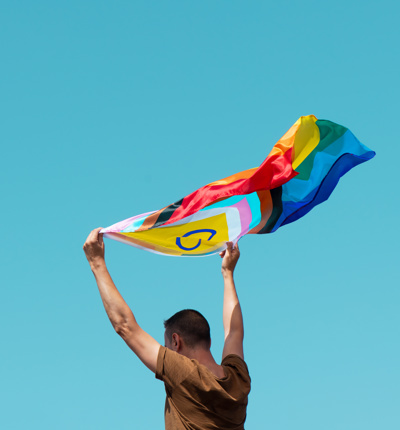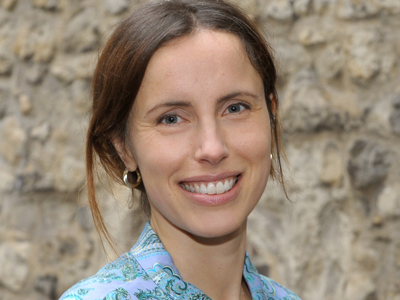
LGBT+ youth charity launch legal challenge to Department for Education over gender questioning guidance consultation
The Proud Trust is calling on the Department for Education (DfE) to make its consultation regarding proposed guidance for schools on ‘gender questioning children’ accessible to Disabled people and inclusive for young people.
Posted on 29 February 2024
The Proud Trust, an LGBT+ youth charity has sent a legal letter to the DfE, alongside its Rainbow Flag Award partners. The charity says the department’s consultation process is not accessible to Disabled people as it has not been made available in alternative formats such as British Sign Language (BSL), Easyread, or Braille.
The charity also argues that a plain language version should be available for young people as the use of overly complex language in the document is unsuitable for children and young people, who should be entitled to participate in the consultation. The charity says that other ways of conducting the consultation process, such as face to face meetings and workshops, should also be available.
The DfE’s draft “Guidance for Schools and Colleges: Gender Questioning Children” is open for consultation until 12 March.
In a legal letter from solicitors Leigh Day, the Proud Trust asks the Secretary of State for Education, Gillian Keegan, to “publish alternative formats of the consultation document for Disabled people, and to design a process suitable for collecting the views of children and young people”. The letter also asks for the consultation period to be extended, to allow those who have so far been excluded from the process equal time to participate.
The content of the draft guidance itself is not addressed in the letter, which focuses solely on the fairness of the consultation process. The Proud Trust will be carefully considering the legality of any final guidance with lawyers when it is published.
Under rules set out in the Equality Act 2010, the government has a duty not to discriminate against people with protected characteristics, including disability and age, and to consider the equality implications of its activities. Further, the government’s own guidance states that it should engage effectively with hard to reach or vulnerable groups and ensure information is accessible to relevant stakeholders. Its ‘best practice’ guidance also states that any consultation period should not be reduced for Disabled people due to accessible formats not being available from the start.
In this legal challenge, Leigh Day argues that the DfE has failed on two key points when designing the consultation:
The charity also argues that a plain language version should be available for young people as the use of overly complex language in the document is unsuitable for children and young people, who should be entitled to participate in the consultation. The charity says that other ways of conducting the consultation process, such as face to face meetings and workshops, should also be available.
The DfE’s draft “Guidance for Schools and Colleges: Gender Questioning Children” is open for consultation until 12 March.
In a legal letter from solicitors Leigh Day, the Proud Trust asks the Secretary of State for Education, Gillian Keegan, to “publish alternative formats of the consultation document for Disabled people, and to design a process suitable for collecting the views of children and young people”. The letter also asks for the consultation period to be extended, to allow those who have so far been excluded from the process equal time to participate.
The content of the draft guidance itself is not addressed in the letter, which focuses solely on the fairness of the consultation process. The Proud Trust will be carefully considering the legality of any final guidance with lawyers when it is published.
Under rules set out in the Equality Act 2010, the government has a duty not to discriminate against people with protected characteristics, including disability and age, and to consider the equality implications of its activities. Further, the government’s own guidance states that it should engage effectively with hard to reach or vulnerable groups and ensure information is accessible to relevant stakeholders. Its ‘best practice’ guidance also states that any consultation period should not be reduced for Disabled people due to accessible formats not being available from the start.
In this legal challenge, Leigh Day argues that the DfE has failed on two key points when designing the consultation:
- That no alternative formats, including BSL, Easyread, Large Print, Braille, or audio, have been made available. This means that many Deaf people (for whom written English may not be their first language), blind and visually impaired people, and those with learning disabilities are excluded from responding. Further, online documents are not be accessible to people who cannot access the internet. Blind and partially sighted people are twice as likely to be digitally excluded, and many people with learning disabilities are also not online.
- The consultation is also not available in a format that young people will be able to understand and engage in. The Proud Trust considers that the consultation was not designed to engage young people, and contains inaccessible jargon and language aimed at adults and professionals. Alternative measures, such as face to face meetings, workshops, or working directly with youth organisations, which may elicit the view of young people, have clearly not been considered.
Susie Cuthill, Interim CEO of The Proud Trust, says:
“This consultation document is particularly important to us, as many of the young people we work with identify as trans or non-binary. Our research shows that 61% of young people feel that their school would not do well when dealing with transphobic bullying, and 90% of teachers and school staff say they need more training to better equip them in supporting trans students. There is a clear need for practical and supportive guidance on this topic, so it is vital that this consultation includes the voices of the young people, including those with disabilities, who will be affected by it.
“The Proud Trust hopes that the Secretary of State for Education will act quickly to correct these issues and allow Disabled people and young people the chance to participate in this important consultation.”
Leigh Day solicitor Kate Egerton, who is representing The Proud Trust, says:
“The DfE’s draft guidance has been in the pipeline for a significant amount of time. There is simply no good reason why the government could not have complied with its anticipatory duty to make reasonable adjustments for Disabled people and consider the needs of young people, those most impacted by its proposals, from the outset. Yet again, those who are most in need of a voice are left behind. I hope that the necessary steps are urgently taken so that those affected have an equal opportunity to participate in the consultation process.”
“This consultation document is particularly important to us, as many of the young people we work with identify as trans or non-binary. Our research shows that 61% of young people feel that their school would not do well when dealing with transphobic bullying, and 90% of teachers and school staff say they need more training to better equip them in supporting trans students. There is a clear need for practical and supportive guidance on this topic, so it is vital that this consultation includes the voices of the young people, including those with disabilities, who will be affected by it.
“The Proud Trust hopes that the Secretary of State for Education will act quickly to correct these issues and allow Disabled people and young people the chance to participate in this important consultation.”
Leigh Day solicitor Kate Egerton, who is representing The Proud Trust, says:
“The DfE’s draft guidance has been in the pipeline for a significant amount of time. There is simply no good reason why the government could not have complied with its anticipatory duty to make reasonable adjustments for Disabled people and consider the needs of young people, those most impacted by its proposals, from the outset. Yet again, those who are most in need of a voice are left behind. I hope that the necessary steps are urgently taken so that those affected have an equal opportunity to participate in the consultation process.”




